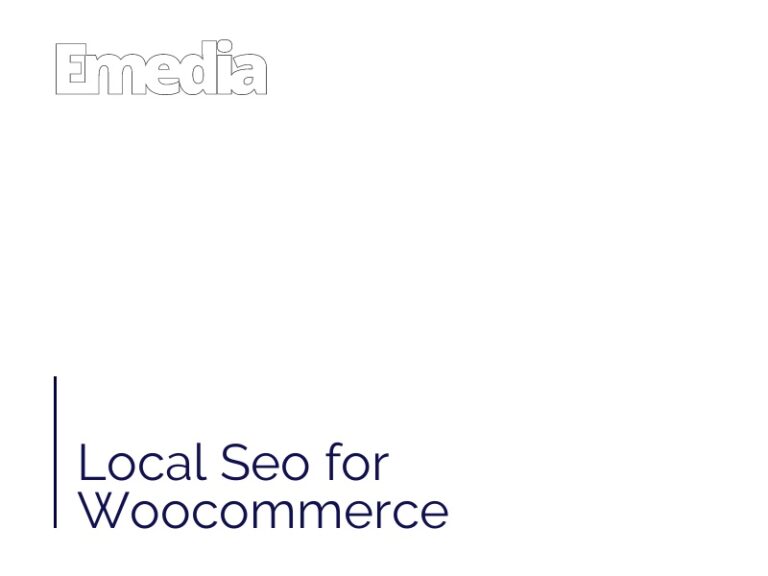In today's highly competitive online marketplace, effective search engine optimization (SEO) strategies are crucial for the success of any ecommerce business.
This article explores the importance of local SEO for ecommerce, providing valuable insights into implementing on-page and technical SEO techniques.
Additionally, it delves into strategies for national SEO and the power of keyword research in optimizing local ecommerce websites.
By analyzing competitors, businesses can gain a competitive edge and drive more targeted traffic to their online stores.
Key Takeaways
- Local SEO is essential for ecommerce businesses as it increases visibility and drives more traffic to online stores.
- On-page SEO techniques, such as geolocation targeting and including location-specific keywords, are crucial for improving local search rankings.
- Boosting technical SEO by implementing schema markup, optimizing website speed, and adding relevant keywords to product pages and images enhances local search visibility.
- National SEO strategies, including creating high-quality content, conducting thorough keyword research, building strong backlinks, and targeting relevant demographics, help expand online presence in ecommerce.
The Importance of Local SEO for Ecommerce
With the ever-increasing competition in the ecommerce industry, the importance of local SEO for ecommerce cannot be overstated. Local SEO refers to the practice of optimizing a website to rank higher in local search results. It is crucial for ecommerce businesses because it allows them to target customers in specific geographic areas, increasing their visibility and driving more traffic to their online stores.
One of the key strategies in local SEO for ecommerce is local citation building. Local citations are online mentions of a business's name, address, and phone number (NAP) on various websites, such as directories, review sites, and social media platforms. By consistently building accurate and up-to-date citations across relevant platforms, ecommerce businesses can improve their local search rankings and attract more local customers.
Another effective tactic in local SEO for ecommerce is leveraging customer reviews. Positive customer reviews not only help build trust and credibility for a business but also contribute to higher search rankings. Ecommerce businesses should actively encourage customers to leave reviews and respond to them promptly. This not only enhances the customer experience but also signals to search engines that the business is actively engaged with its customers and provides quality products or services.
Implementing On-page SEO Techniques for Local Ecommerce
To effectively implement on-page SEO techniques for local ecommerce, businesses should prioritize optimizing their website content and structure. One key aspect is geolocation targeting, which involves tailoring the website content to specific locations. By using geolocation targeting, businesses can ensure that their website appears in local search results when potential customers are looking for products or services in their area. This can be done by including location-specific keywords in the website's content, meta tags, and headers.
Another important on-page SEO technique for local ecommerce is optimizing the website for local business directories. These directories, such as Google My Business and Yelp, play a crucial role in local search rankings. By claiming and optimizing their listings on these directories, businesses can increase their visibility to local customers. This includes providing accurate and up-to-date information about the business, such as address, phone number, and business hours. Additionally, businesses should encourage customers to leave reviews on these directories, as positive reviews can boost their search rankings.
Boosting Your Ecommerce Website's Technical SEO for Local Search
One effective way to enhance your ecommerce website's technical SEO for local search is by implementing schema markup to provide search engines with specific details about your business, such as its name, address, and phone number. Schema markup is a code that you can add to your website to help search engines understand the content better and display it in a more relevant manner. By including schema markup, you can improve your website's visibility in local search results and increase the chances of attracting local customers.
Another aspect of technical SEO that you should focus on is analyzing website speed. Slow loading websites can have a negative impact on user experience and can also affect your search engine rankings. To optimize your website's speed, you can start by compressing images, minimizing the use of plugins, and optimizing your code.
Optimizing your product pages is also crucial for local SEO. Make sure to include relevant keywords in your product titles, descriptions, and URLs. Additionally, optimize your product images by adding alt tags that contain relevant keywords. This will help search engines understand what your products are about and improve the chances of your website appearing in local search results.
Going Beyond Local: Strategies for National SEO in Ecommerce
Furthermore, implementing effective strategies for national SEO in ecommerce is essential for expanding your online presence and reaching a wider audience. While local SEO focuses on optimizing your website for specific geographic locations, national SEO aims to expand your reach beyond local boundaries. To achieve this, it is crucial to target demographics that are relevant to your business.
One strategy for national SEO is to create high-quality, informative content that appeals to a broader audience. By researching and understanding the interests and preferences of your target demographics, you can develop content that resonates with them. This can include blog posts, articles, videos, and social media content.
Additionally, optimizing your website for national SEO involves conducting thorough keyword research. By identifying popular search terms related to your products or services, you can incorporate these keywords into your website's content and meta tags. This will improve your website's visibility in search engine results and attract more organic traffic.
Another effective strategy is to build strong backlinks from reputable websites. By partnering with influencers, bloggers, and industry experts, you can generate high-quality backlinks that enhance your website's credibility and authority.
Uncovering the Power of Keyword Research in Local Ecommerce SEO
By delving into the depths of keyword research, local ecommerce businesses can unlock the potential to optimize their website and attract targeted traffic from their specific geographic location.
Optimizing product descriptions is an essential aspect of keyword research in local ecommerce SEO. When creating product descriptions, businesses should focus on incorporating relevant keywords that reflect the local nature of their target market. By using location-based keywords in product descriptions, businesses can increase their chances of appearing in local search results.
Another crucial aspect of keyword research in local ecommerce SEO is localizing meta tags. Meta tags are HTML elements that provide information about a webpage to search engines. By localizing meta tags, businesses can signal to search engines that their website is relevant to a specific location. This can help improve the website's visibility in local search results and attract targeted traffic from the desired geographic location.
In addition to optimizing product descriptions and localizing meta tags, businesses should also consider other keyword research strategies such as analyzing local search trends and targeting long-tail keywords. By staying up-to-date with local search trends, businesses can identify popular keywords that can be incorporated into their website content. Targeting long-tail keywords, which are longer and more specific keyword phrases, can also help businesses attract highly targeted traffic and improve their chances of converting visitors into customers.
Gaining the Competitive Edge: Analyzing Competitors in Local Ecommerce SEO
To gain a competitive edge in local ecommerce SEO, regularly monitoring and analyzing competitors' strategies is essential. By understanding what your competitors are doing, you can identify local ecommerce trends and adjust your own strategies accordingly. Analyzing competitor strategies allows you to see what is working for them and what is not, giving you valuable insights into how to improve your own SEO efforts.
One effective way to analyze competitor strategies is by conducting a competitor analysis. This involves researching and evaluating your competitors' websites, content, keywords, backlinks, and social media presence. By comparing their strategies to yours, you can identify areas where you can outperform them and areas where you can improve.
To help you organize your competitor analysis, here is a table that you can use:
| Competitor | Website | SEO Strategy | Strengths |
|---|---|---|---|
| Competitor 1 | www.example.com | Targeted keywords | Strong backlink profile |
| Competitor 2 | www.example2.com | Local content | Large social media following |
| Competitor 3 | www.example3.com | User-friendly | High conversion rate |
Frequently Asked Questions
How Long Does It Take to See Results From Local SEO Efforts for an Ecommerce Website?
It typically takes several months to see tangible results from local SEO efforts for an ecommerce website. The importance of user-generated content and the impact of online reviews on local SEO cannot be underestimated.
Are There Any Specific Guidelines or Best Practices for Optimizing Product Descriptions for Local SEO in Ecommerce?
When it comes to optimizing product descriptions for local SEO, there are specific guidelines and best practices to follow. These guidelines ensure that your descriptions are optimized for local search, helping to improve your website's visibility and drive more targeted traffic.
Can Social Media Platforms Play a Role in Improving Local SEO for Ecommerce Websites?
Social media platforms can greatly impact local SEO for ecommerce websites through effective social media marketing strategies. User-generated content on these platforms can contribute to improved local SEO by increasing brand visibility and engagement with local customers.
What Are the Key Factors to Consider When Selecting the Right Keywords for Local SEO in Ecommerce?
When selecting keywords for local SEO in ecommerce, it is important to consider the relevance of long tail keywords and their impact on search volume. Balancing keyword relevance and search volume is crucial for effective local SEO strategies.
Is It Necessary to Constantly Monitor and Update Local SEO Strategies for an Ecommerce Website, or Is It a One-Time Effort?
Continuous monitoring and updating of local SEO strategies for ecommerce websites is crucial for long-term success. By regularly assessing and optimizing keywords, content, and local listings, businesses can stay competitive and ensure maximum visibility to their target audience.












